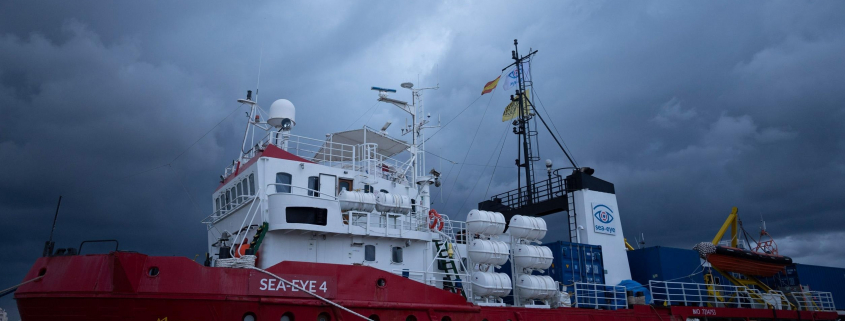Italy escalates sanctions against rescue ship SEA-EYE 4
60 days detention for preventing an illegal pushback
After rescuing a total of 145 people from distress at sea during two operations on 7 and 8 March, Italian authorities detained the ship SEA-EYE 4 for 60 days on 11 March and fined it 3,333 euros. The reasoning behind this is not tenable, as the SEA-EYE 4 is not permitted under international law to take part in a pushback to the civil war country of Libya. This would have been the case if it had interrupted its advanced rescue operation and handed over the 84 people seeking protection to the so-called Libyan coastguard, which had approached with weapons at the ready. Italy is once again de facto penalising rescue ships for complying with international law. Sea-Eye will once again take legal action against the blockade, as it has done in previous cases.
Italy’s top appeals court only confirmed in February this year that pushbacks to Libya are illegal under international law, thereby confirming the criminal conviction of a captain who brought refugees back to Libya in 2018. People seeking protection must not be returned to a years-long, cruel civil war from which they fled. The list of serious human rights violations (e.g. torture, slavery, rape, arbitrary executions) to which refugees are subjected there is long.
Italy is now penalising the SEA-EYE 4 and two other German sea rescue vessels that have already been detained for not following the instructions of the so-called Libyan coastguard. However, these instructions would have led to participation in pushbacks, as the so-called Libyan coastguard is taking the fleeing people back to the civil war. The illegality of this action is particularly evident in reports of human rights violations suffered by people after a pushback in Libya.
“Although it is illegal and deeply inhumane to return people to a bloody conflict from which they have fled, Italy is demanding that German sea rescue organisations take part in precisely such operations. Our refusal to take part in these horrific abductions is penalised with ship blockades and fines. Yet only Germany, as the flag state, is authorised to sanction our ship for misconduct in international waters. Now that three German sea rescue ships have been detained in Italy, it is up to the German government to finally intervene and take political responsibility for the humanitarian missions of German rescue ships,” says Gorden Isler, Chairman of Sea-Eye e.V.
On 7 March, the SEA-EYE 4 was the first to find the distress case which led to the arrest and was unable to make contact with the so-called Libyan coastguard during the search. When the rescue was already at an advanced stage and people had been evacuated from the unseaworthy rubber boat, two coastguard vessels appeared at the scene and demanded that the operation be cancelled. The so-called Libyan coastguard aimed weapons at the crew of the rescue boat. The crew of the SEA-EYE 4 de-escalated the situation and brought all the people on their rescue ship to safety. On 10 March, all the people who had fled were able to go ashore in Reggio Calabria, where the SEA-EYE 4 is now detained. This is the longest administrative detention of a sea rescue ship under the Piantedosi Decree to date.


 Melissa Marchi
Melissa Marchi